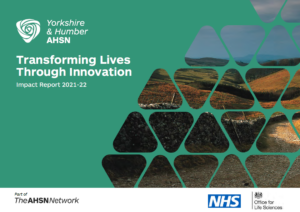Supporting better safer care for more than 207,000 patients in 2021-22
Posted: 26th July 2022
 Over the past year, more than 207,000 patients have benefited from better, safer care through the collaborative work of the Yorkshire & Humber AHSN and its partners.
Over the past year, more than 207,000 patients have benefited from better, safer care through the collaborative work of the Yorkshire & Humber AHSN and its partners.
The pandemic continues to pose considerable challenges for the healthcare system increasing pressure on the workforce and service delivery. It has also highlighted the essential role of innovation in helping the sector to recover and prepare for the future.
Our work with NHS partners, healthtech innovators and life sciences companies has supported programmes and initiatives to help improve patient care outcomes and increase efficiency in healthcare delivery. Read our latest Impact Report 2021-22 to find out how.
Richard Stubbs, Chief Executive of Yorkshire & Humber AHSN and Vice Chair of the AHSN Network, said: “There are five critical themes that are common to challenges being faced by all our NHS partners that permeate across our work: supporting the NHS’s post-pandemic recovery; advocating for levelling up as a driver for inclusive economic growth; addressing health inequalities; improving equality, diversity and inclusion; and acting against climate change.
Ultimately it is our job to connect innovators, NHS partners and academia to help identify, develop, and implement solutions that can help to tackle these challenges for the benefit of patients, healthcare staff and the communities we serve”.
Over the last four years, our priority has been to forge strong partnerships with the three Integrated Care Systems (ICSs) in our region. We have taken a unique approach through the development of our Innovation Hubs, and by embedding our staff within each ICS we have been able to really get to grips with their ambitions, needs and priorities.
Rob Webster, CEO Lead for West Yorkshire Health and Care Partnership, said: “The Yorkshire & Humber AHSN is fundamentally an expert partner in using innovative approaches to benefit people needing care and support. Our relationship with our AHSN has demonstrated how, by working together, we can really make a success of innovation, and how this can make a huge difference to people’s lives across West Yorkshire” Find out more in this brief video interview with Rob Webster
By building true partnerships between health care providers, commissioners, academia and industry, we help to find the best solutions to support our NHS partners and ensure patients across our region receive the best possible care.
One example of this is our work with the NHS in Hull and Astra Zeneca to help improve asthma care. Hull is a region with the highest use of blue inhalers (a type of inhaler that helps to temporarily relieve the symptoms of asthma, but does not help to treat it) in the country. The SENTINEL programme helped to reduce the reliance on, and prescribing of, blue inhalers for asthma sufferers and therefore also the greenhouse gas emissions they produce. So far, this work has helped to offset 457 metric tonnes of CO2e emissions equating to more than 571 transatlantic flights. The project was recently awarded ‘Environmental Sustainability Project of the Year’ in the HSJ Partnerships Awards 2022.
Talking about this initiative, Dr Michael Crooks, Respiratory Consultant and Senior Lecturer at Hull University Teaching Hospitals NHS Trust and Hull York Medical School, said: “I genuinely think that the AHSN’s involvement has been great for SENTINEL and will continue to be. The reach and impact that the webinars had, the HSJ awards and the potential to have SENTINEL adopted as a Rapid Uptake Product wouldn’t be possible without their involvement. I think that supporting adoption within regions has been really valuable because one of the key drivers to sustained change is persistent and consistent messaging, and reaching as many people across the care pathway as possible. I think the partnership approach really has added value.”
A central element of our role is the adoption and spread of commercial innovations that not only improve health outcomes and drive healthcare efficiencies, but also stimulate inclusive economic growth in the life sciences sector by supporting the creation of jobs and further investment in Yorkshire and the Humber.
We do this through a variety of activities including helping to identify funding streams, organising workshops, creating networking opportunities and supporting innovators to further develop their solutions. In 2021-22, we have helped to leverage a total of over £22m of investment into our region. We have supported 42 grant applications, 14 of which were successful, including £900,000 Small Business Research Initiative (SBRI) funding for PinPoint Data Science’s cancer detection test, and a further £100,000 each from SBRI for four companies with carbon-friendly products.
We have organised 49 bespoke innovation surgeries, giving SMEs the chance to speak to us directly for advice and guidance, providing over 1,567 hours of support to 283 companies, safeguarding over 50 jobs and contributing to the creation of 20 jobs in our region.
Over 55 hours of bespoke support has been delivered to 10 companies through our digital health accelerator programme Propel@YH generating £57,000 of investment in the Leeds region.
Commenting about Propel@YH – Dr Raj Palmar, a junior doctor at Mid Yorkshire NHS Hospitals Trust and founder of Rewire Stroke (an app that uses machine learning to deliver personalised stroke physiotherapy) said: “We are an early-stage start-up and gained a lot of value from the Propel@YH programme. Recently we have managed to secure £18,000 of Innovate UK funding which we used for user-testing sessions, rebranding, and legal work. We are preparing to launch our product into the NHS and are working to secure an evaluation pilot in the Yorkshire region.”
For full details of our 2021-22 impacts, read our report.
